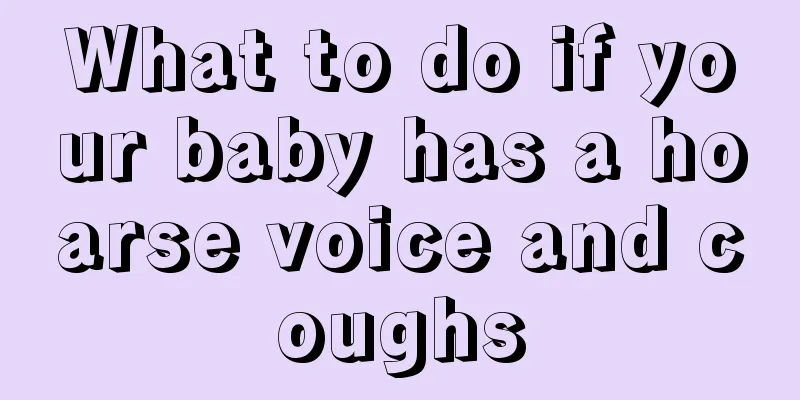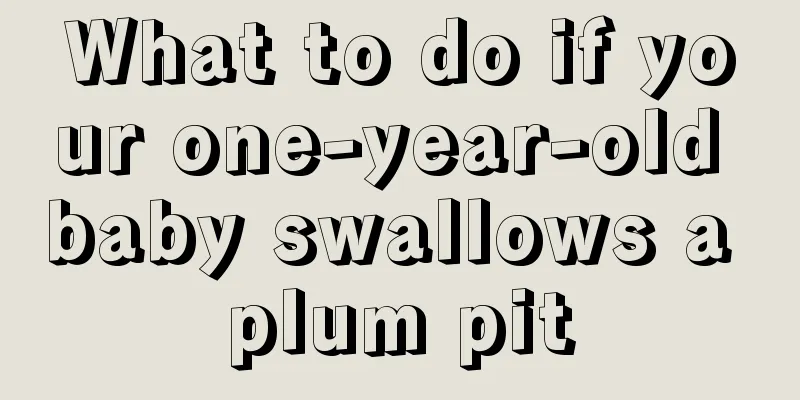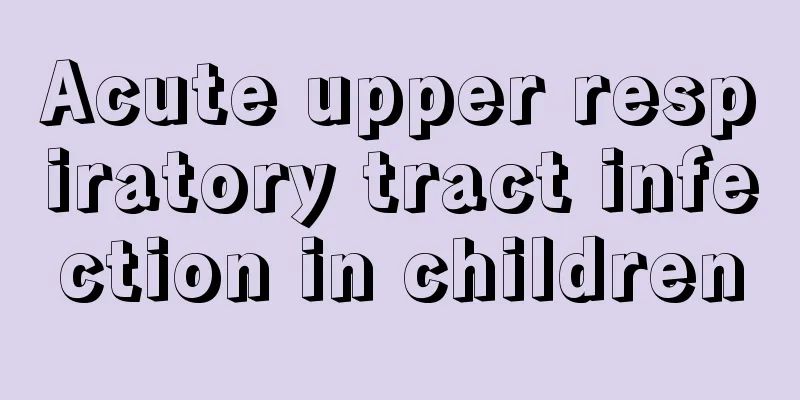What to do if your baby has a hoarse voice and coughs

|
In fact, hoarseness and coughing in babies are very common in summer. Sometimes it is caused by getting angry, sometimes by a cold, and sometimes by respiratory inflammation. What should we do if babies have hoarseness and coughing? Only by finding the correct cause and prescribing the right medicine can we cure the disease and protect babies from pain, especially newborn babies, who don’t know anything. Isn’t this discomfort going to kill mothers? Generally speaking, coughing is a normal physiological defense reflex of children and is the body's way of clearing its own respiratory tract. If the child coughs slightly when he gets up in the morning, he is clearing the mucus accumulated in the respiratory tract the night before. Parents do not need to worry. The child's cough reflex is still relatively poor and the cough may last for a long time. If parents rush to give the child various cough suppressants at this time, the mucus in the respiratory tract cannot be discharged smoothly and accumulates in the trachea and bronchi in large quantities, which can easily cause tracheal obstruction and cause the child to suffer from other diseases. Abnormal cough should be carefully identified If a child's cough is very severe and lasts for a long time, it may be related to some disease. At this time, parents should make timely judgments based on certain standards and take the child to a doctor as soon as possible. Symptom 1: “Light in the morning and heavy in the evening” Characteristics of cough: The cough is relieved during the day and becomes severe at night. When the condition is serious, a harsh wheezing sound will be emitted, which is similar to the sobbing sound of a child after crying for a long time. Suspected diagnosis: Pseudomembranous laryngitis Solution: When children cough at night, parents can open the bedroom windows while ensuring that the children are warm, allowing fresh air to enter the room. The more humid and cool air can help relieve the symptoms of respiratory swelling. If his cough becomes more severe or he has difficulty breathing, he should be taken to the hospital for treatment immediately. Symptom 2: Violent coughing fits Characteristics of cough: Violent and hoarse coughing, with sharp roaring sounds when the child inhales forcefully. Suspected diagnosis: pertussis. Solution: If the cough persists, you should take him to see a doctor. Symptom 3: Coughing after eating Characteristics of cough: Children experience wheezing and persistent, hoarse coughing after eating. Suspected diagnosis: Reflux esophagitis. Solution: Let your child keep an upright position within 30 minutes after eating, and slightly elevate the head when sleeping. If there is no improvement, seek medical attention as soon as possible. Symptom 4: The most sensitive cough Cough characteristics: Persistent cough often accompanied by wheezing or panting, worse at night or after exercise, especially when exposed to pollen, cold air, animal dander, dust or smoke. Suspected diagnosis: asthma. Solution: Go to the hospital for a thorough examination to confirm the diagnosis. If there is a family history of allergies, asthma or eczema, you should tell the doctor, because in this case, the child is more likely to suffer from asthma. Symptom 5: Coughing in the throat Characteristics of the cough: A slightly hoarse cough originating from the throat, occurring at intervals, sometimes dry, sometimes with phlegm, and the child complains of a sore and itchy throat. Suspected diagnosis: common cold, influenza, respiratory viral infection. Treatment method: In addition to cooperating with the doctor's treatment, children should be given more water and a humidifier should be used to relieve symptoms of airway congestion. Symptom 6: Cough with difficulty breathing Characteristics of cough: cough with phlegm or accompanied by wheezing, shortness of breath, weak breathing, or difficulty breathing. Suspected diagnosis: bronchitis. Solution: If your child has trouble breathing, cannot eat or drink, take him to the hospital immediately; if your child's symptoms are mild, such as wheezing but not difficulty breathing, parents can put a humidifier in his room to help remove mucus from his lungs, and make sure he drinks enough water. I believe that as long as there are parents with babies, as long as the baby is uncomfortable, parents will definitely feel distressed. However, just feeling distressed and anxious cannot alleviate the suffering of the baby's illness. So what should we do if the baby has a hoarse voice and cough? In addition to doing some necessary treatments, mothers should also pay more attention to the baby's daily living habits and make sure they drink more water, which can also help alleviate the condition. |
<<: What causes a baby's throat to become inflamed and hoarse?
>>: Why does my baby's hair get wet when he sweats while sleeping?
Recommend
Basic symptoms of sudden crying in babies at night
Many babies cry at night, which prevents adults f...
How can children overcome inferiority and become confident?
For children, if they have an inferiority complex...
What are the benefits of eating more vegetables for young children?
Vegetables are foods that we must eat every day i...
What should I do if my baby who is more than two months old always has feces on his buttocks?
Babies are the apple of their parents' eyes. ...
How do parents deal with children's fear?
In the process of growth and development, childre...
Normal range of blood pressure and dietary care for children
As many children nowadays become picky eaters and...
How to deal with a 3-year-old baby's low-grade fever
Low fever is very normal now. There are many fact...
What to do when red spots appear on the child's body
I believe everyone knows the importance of skin t...
What to do if a five-year-old boy is constipated?
Constipation is a common disease in life. For som...
Why does my 4-year-old baby drool while sleeping at night?
It is normal for children to drool when they are ...
Is it good to bathe your baby before bed?
Many families with children spend every day with ...
What can children with poor physical fitness eat to strengthen their physical fitness?
I believe that the most headache-inducing thing f...
Where should I apply moxibustion to a child with a cough?
Many children often catch colds and may even coug...
What to do if the baby's umbilical cord becomes suppurative
When a baby comes into this world, it brings some...
What are the benefits of eating walnuts for children?
Walnuts are rich in nutrients and are very benefi...









